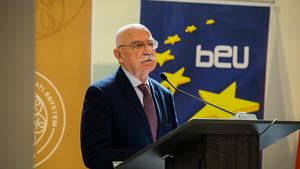Europe Day 2023: When the future began.
When the future began.
Lessons from the history of the European Union
08 May 2023, UPS
At the Europe Day Event, co-organised 8 May 2023 by the University of Public Service and the Otto Habsburg Foundation, experts gathered to discuss the lessons of the history of European integration.
The event brought together academics and politicians to review the history of integration and to share their thoughts on the future of the European Union.
"Every May, we Hungarians commemorate not only the foundations of the Union, but also Hungary's accession to the European Union," said Justice Minister Judit Varga, adding that next year - when Hungary will once again hold the rotating presidency of the Council of the European Union - we will celebrate the 20th anniversary of our membership. "The European Day of Peace and Unity is celebrated every year on 9 May, and this year the message of the event is of great significance," said rector Gergely Deli in his welcome speech.
János Martonyi, Hungary's former Foreign Minister, spoke about how the European integration process stated. Speaking of Jean Monnet, he said that it was because of him that integration had moved beyond the legal framework and that autonomous institutions had been created to which sovereign states had transferred decision-making powers.
The Treaty of Rome was signed on the Capitoline Hill, at the statue of the Pope, and the Treaty of Lisbon was signed in the monastery named after St Jerome, which means that Christianity is part of European identity, said Gergely Prőhle, head of the Institute for Strategic Studies of the university and director of the Otto Habsburg Foundation.
After the welcoming speeches, a round table discussion was held on the topic of European History - Hungarian Fate moderated by Boglárka Koller, Jean Monnet Chair and Vice-Rector for International Affairs at the National University of Budapest.
Recalling a visit to Australia in 2009, Tibor Navracsics, Minister for Spatial Development said: 'It was very strange to be confronted as a European with a map of Europe that did not have Europe at its centre, as we Europeans are used to. István Hiller, former Minister of Culture and Education and Member of Parliament, said that first felt free and European when he no longer had to turn around at the border and can directly travel to Austria without stopping. The third participant in the panel discussion, István Mustó, a former staff member of the German Development Institute and former Member of Parliament, spoke about the changes in world politics that have influenced integration: America has become a hegemonic power, the Soviet Union has disappeared and China has emerged. In the second part of the conference, moderated by Gergely Prőhle, Helmut Wohnout, Director General of the Austrian State Archives, spoke about the Austrian vision of the EU between 1945 and 1995, followed by a presentation on the European Union Historical Archives by Dieter Schlenker, Director of the Historical Archives of the European Union (European Union Institute, Florence), and a final presentation on History, Memory and the European Project by Aline Sierp, lecturer at Maastricht University.
https://www.uni-nke.hu/hirek/2023/05/09/az-integracio-multja-es-jovoje-europa-nap-az-nke-n
